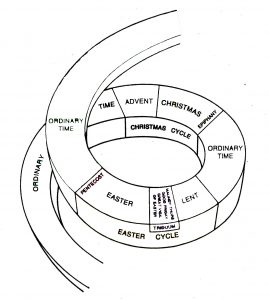
Sometimes people, extremely well-meaning people, even and especially those who have grown up in historic churches who observe the ancient church year and its propers and festivals and all that, will ask a very innocent question, “Why observe the church year?” Also sometimes, people, not so well-meaning people, especially those who have grown up in such churches, will ask the same question, but not so much for an answer as for an opening to explain why we Christians should give up our calendar.
Now, Christian churches without the church year can certainly still be churches. Indeed, Christian churches without the church year can even still be Christian churches. That isn’t a question. The church year falls into the category of what has been termed adiaphora, a thing neither commanded nor forbidden by God, an indifferent thing (although it can make a big difference when thoughtfully observed). That being said, adiaphora doesn’t mean what most people assume it means. The fact that something is an adiaphoron isn’t where discussion ends, but where it begins. It is not where value is jettisoned, but where it is weighed, through thoughtful examination of what a practice brings or doesn’t bring, positive or negative, to the equation.
As someone who spent ten years immersed in the church year in a unique way as a pastor, I have a deep appreciation for what it does offer. The church year teaches. It shapes our time. It focuses us on Christ’s life, death, and resurrection, as well as the origins, purpose, and hope of the Christian Church and Christian people. And it does this, not only for certain people, but for all. It fills the eyes with colors and symbols. It fills the ears with lessons, prayers, psalms, and hymns. It sets us in procession or in our pew, stands us up or brings us to our knees. Moreover, it pulls us out of all that so easily distracts it. The church lives on its own time. It has its own calendar, its own holy days (holidays). While it doesn’t pull Christians out of the world—in fact it sends them out into the world; refreshed, forgiven, and keenly aware of their vocations and their neighbors’ needs—it does remind them that their citizenship is not in this world alone and that their hope and horizons extend beyond what this world and everything in it can offer. It, in a very real way, reminds us to let the bird fly, to go forth with our salvation complete and our hope sure and certain, to live, not to find love, but as those loved, and to love those God has placed around us. It gets us wet with Baptism again and again through Absolution. It feeds us again and again with the Supper. It sets Christ’s deeds and words before us again and again, and in countless different ways, and it teaches us to pray, sing, confess, and speak of the same.
Three years out of parish ministry, I find myself missing what I once had, when it comes to my immersion in the church year, that is, as a pastor of a congregation. I’ve come to realize, though, that I don’t need to return to parish ministry to rekindle that. Rather, it’s been my own failure to pay attention and intentionalize my liturgical life that has led to my diminished moorings in the church’s calendar. The same is true for all people in the pews. We can make use of the bulletin, pray the prayers of the church throughout the week, ponder the lessons, turn the sermon over in our head, pray and sing the hymns in our homes, draw upon a rich heritage of customs intended to bridge the gap between the church building and the home. We can do this especially as fathers and mothers, and I know I for one, chief of sinners, can do better at that.
That being the case, though, when I next join my brothers and sisters in God’s house, it will be to celebrate Pentecost, and God will come again to all who should have done and could do more and bring, not condemnation, but forgiveness and life. He will come with the merits of Christ’s death and resurrection, with the Spirit’s comfort, with the Father’s tender provision and care. And this is one of the chief benefits of the church year. It helps to keep us from losing our focus, from forgetting why the church exists and what God has given the church to give, which no one else, no other organization in this world, can give: Christ and His Gifts, the gospel in Word and Sacrament. For every rushed sermon or poorly practiced service, the church year makes sure we leave with what Christ came to send us away with, namely, Himself.
Enjoy the red this Sunday, brothers and sisters. Enjoy all the colors of the year, the prayers, the hymns, the lessons, the special rites and customs. Stand, sit, kneel, process, recess, your way through the Christian calendar and rejoice to have it, as you see Christ conceived and born, preaching, teaching, healing, and redeeming, dying, rising, ascending, and preparing to come again, bringing together His Church and then sending it out by the Spirit’s own sending, watering, feeding, comforting, seeking, admonishing, restoring, killing and making alive by the two-edged sword of law and gospel. Could we do without it? I suppose. But I have a hard time thinking we’d be better off for doing so.

You must be logged in to post a comment.